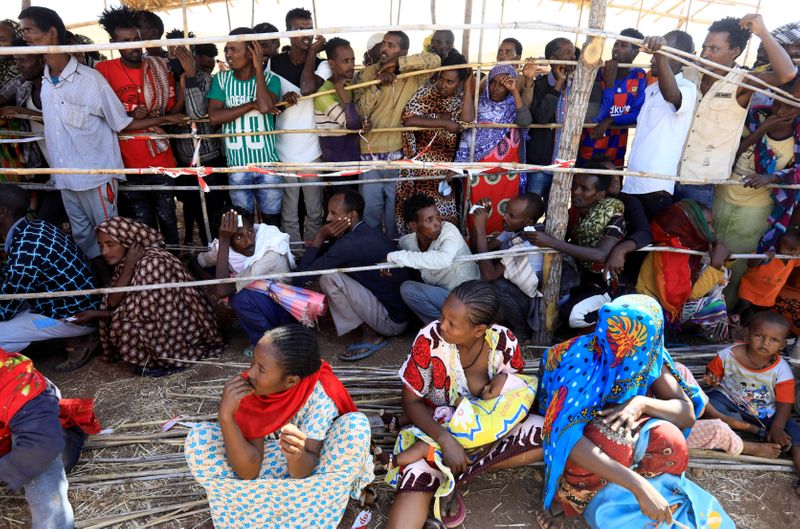By Khalid Abdelaziz, Ali Mirghani and Nafisa Eltahir
KHARTOUM/DUBAI (Reuters) - Clashes along Sudan's eastern border and the influx of tens of thousands of refugees from neighbouring Ethiopia have added to the challenges faced by a country already navigating a fraught political transition and protracted economic crisis.
Internal conflict in Ethiopia has driven more than 50,000 refugees into Sudan in just over a month, triggering a complex aid operation in an impoverished region of Sudan.
And fears of unrest in Ethiopia's northern Tigray region spilling into Sudan were fuelled when several Sudanese soldiers were killed on Tuesday, in what Khartoum called an "ambush" by Ethiopian forces and militias inside its borders.
Ethiopian officials did not immediately respond to requests for comment on the incident.
Sudan has boosted its military presence near its eastern frontier since the conflict between Ethiopian federal forces and the Tigray People's Liberation Front (TPLF) started on Nov. 4.
But forces from Ethiopia's Amhara ethnic group, which back the government of Prime Minister Abiy Ahmed, have also expanded their activity, leading to other incidents in long-disputed farmlands near the border where refugees have been crossing, Sudan's information minister Faisal Salih told Reuters.
"The tensions increased and some skirmishes took place recently," he said.
Amhara farmers claim rights to lands in the al-Fashqa plain also claimed by Sudan, and clashes sometimes flare during planting and harvest seasons.
Tigrayan refugees now hosted in eastern Sudan hold Amhara forces responsible for much of the violence they fled since early November.
Prompted by security concerns, Sudan's Prime Minister Abdalla Hamdok flew to Ethiopia on Sunday with what senior Sudanese officials said was a proposal to mediate.
Ethiopia, which declared victory over the TPLF on Nov. 29, said the offer was unnecessary. The TPLF has said it was continuing to fight.
Accounts are difficult to verify because most communications to the region have been down throughout the conflict.
Hamdok and Abiy agreed to revive a commission to settle their border dispute, which dates back to colonial times, and made progress over stalled three-way talks with Egypt on a giant hydropower dam Ethiopia has built on the Blue Nile, said Salih.
A diplomatic source in Sudan said Ethiopia's ambassador had been summoned over the troop deaths on Tuesday, but Abiy struck a conciliatory tone, tweeting: "Such incidents will not break the bond (between) our two countries as we always use dialogue to resolve issues."
VOLATILE REGION
Some people in Sudan are concerned that the fighting in Tigray, in which regional diplomats and humanitarian aid workers believe thousands of people have died, poses a threat to a volatile region.
The United Nations estimates that 950,000 people have been displaced by the crisis https://tmsnrt.rs/2KEWEmV.
"The conflict area in Ethiopia is a border area, and it's close to Sudan, Eritrea, and South Sudan. It can impact the whole region, and the Red Sea region," said Mervat Hamadelnil, head of a Sudanese civil society initiative that has pushed for Sudan to take an active stance on the Tigray war.
Some also worry about the strain that refugee arrivals are placing on Sudan, which is trying to recover from decades of its own internal conflicts that displaced several million people.
An economic crisis has deepened since the overthrow of former president Omar al-Bashir in April 2019, causing fuel and bread shortages and pushing inflation to more than 250%.
When the first refugees arrived last month, local communities in eastern Sudan welcomed them, residents and officials say.
But the influx has also pushed up the prices of basic goods, and aid agencies are struggling to source food, water and healthcare for refugees.
Sudan's government has told many civil servants to work from home following a rise in coronavirus cases, complicating logistical operations. The head of Sudan's refugee commission died from COVID-19 earlier this month.
One pressure point is that Sudanese authorities, supported by the United Nations, are keen to move refugees quickly away from the border to camps, partly for fear that Tigrayan forces could use Sudan as a rear base, said a staff member of an aid organisation working in the area.
Some refugees are reluctant, hoping to return to Ethiopia to recover relatives, possessions and crops.
Three decades ago, Sudan backed Tigrayan forces that toppled Ethiopia's Marxist Derg rulers in a conflict that sent previous waves of refugees fleeing west over the border.
Sudan's transitional authorities, grateful for Ethiopia's mediation between the Sudanese military and civilian groups after Bashir's overthrow last year, now have no interest in playing a similar role against an Abiy government with international standing, said Suliman Baldo, a policy adviser for The Sentry, a Washington-based research group.

"Sudan needs to be very careful. They cannot afford now to be hosting opposition leaders and opposition armed groups," he said.
(Additional reporting and writing by Aidan Lewis; Editing by Mike Collett-White)